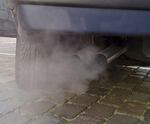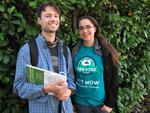
Tailpipe emissions.
Flickr/eutopication and hypoxia
If you could make energy companies pay $25 for every ton of carbon pollution they emitted, would you?
What if that tax meant your gasoline cost 25 cents more per gallon and your electric bill went up? But wait. Consider that the revenue from that tax cut the state taxes on sales and businesses and gave money back to low-income families in the form of a rebate.
That’s the decision Washington voters face on the November ballot, thanks to a group called CarbonWA, which has been building momentum on a carbon tax initiative for several years.
, as it’s called, lacks the deep-pocketed billionaire support of other initiatives on the ballot this year, but it has galvanized young voters and hundreds of individual donors around the Puget Sound region.

Ben Silesky and Sydney Allen go door to door to raise awareness and support for 2016's Initiative 732, which would put a tax on carbon emissions in Washington.
Ashley Ahearn, KUOW / EarthFix
“We’re out here because we’re clearly not moving fast enough to avoid ecological disaster,” said Ben Silesky, an organizer with CarbonWA, as he grabbed a clipboard and prepared to ring door bells in Seattle’s Phinney Ridge neighborhood on a recent Sunday morning. “Our entire society is based on artificially cheap fossil fuels and so we need to get the momentum going in the opposite direction.”
Supporters of I-732 have contributed more than a million dollars, almost quadrupling the amount of money coming in from opponents of the initiative, which include steel manufacturers, pulp and paper mills, and electric utilities.
Use KUOW's 'Field Guide to Influence' to follow the money in Washington's elections.
But there are other opponents that don't show up in the fundraising data. Mainstream environmental groups, like Sierra Club, Climate Solutions and others, do not support the carbon tax initiative because they see it as a blunt instrument that does not cap or limit carbon emissions or specifically fund environmental policies such as renewable energy sources, electrification of the transportation sector, or green job creation. Others say I-732 was not developed with communities of color or lower socioeconomic status in mind.
"Getting a sales tax break of 1 percent when you don't have much money to begin with ... doesn't really do anything," said Rebecca Saldaña, executive director of Puget Sound Sage. Under a carbon tax the average price of a gallon of gasoline will increase by 25 cents, a blow to low-income people who live farther away from public transit and often need to drive to multiple jobs.
“If you have wealth you can figure out, when you get a tax, you can change some of your habits. If you don’t have much money there’s not much you can change,” she said.

“To me it’s a step backwards,” said Rebecca Saldaña (right), executive director of Puget Sound Sage. She and Paulina Lopez, Duwamish River Cleanup Coalition, said will vote 'no" on I-732 in November.
Ashley Ahearn, KUOW / EarthFix
Taxing carbon emissions makes it more expensive for all of us to use fossil fuels, but it does not actually set any limits on the total amount of emissions we release. British Columbia enacted a carbon tax in 2008 and while carbon emissions dropped initially, that trend has not continued. However, since the tax went into effect, gasoline usage has fallen consistently, now that gas is more expensive there and fuel efficiency in vehicles has gone up. Transportation accounts for 40 percent of the emissions in Washington state so, in theory, a state carbon tax would reduce that sector of our emissions portfolio.
Hardline environmentalists say I-732 doesn’t go far enough. The science is clear: Globally, greenhouse gas emissions should be cut drastically in order to avoid climate catastrophe in the coming decades. While a tax discourages fossil fuel usage, it doesn’t mandate reductions, as a cap-and-trade system would.
By capping overall emissions and requiring those that exceed the cap to purchase credits or offsets for their excess emissions, revenue is generated for state environmental and green jobs programs, as has happened under the cap-and-trade program in effect in California. Puget Sound Sage's Saldaña says that kind of policy would make a real difference for low-income people and communities of color in Washington — a tax rebate wouldn't.
"People spending $100 on groceries and having 1 percent less in sales tax is not going to make their families healthier. It's not going to clean their air. It's not going to create the infrastructure investments that we need to do to electrify our system and give people different choices. That's the part that's unfortunate," Saldaña said.
But, try as Gov. Jay Inslee might, he has been unable to put a cap-and-trade system into effect in Washington. The state Department of Ecology recently finalized a carbon cap rule under the state clean air act, but the rule has already garnered legal opposition from electric utilities and fossil fuel companies operating in the state.
However, while the fossil fuel industry may be fighting state efforts to limit carbon emissions, it's remaining neutral on the carbon tax ballot initiative.
"We're just monitoring it." said Frank Holmes, spokesperson for the Western States Petroleum Association. "If a policy choice is made to do something, then a well-designed market mechanism is where we have a sense of it working and this [I-732] seems to be a well thought out, transparent, revenue neutral carbon tax."
WSPA has not spent any money to oppose the initiative, though its members spent heavily to defeat the cap-and-trade system that is now in place in California.
If I-732 were to pass, there is no guarantee that it will integrate with Washington state's carbon-cap rule, and critics worry that it would instead derail state efforts to put a more comprehensive climate policy in place.
"No one started this process thinking about how to design these things to interact with each other," said Chris Best, lead climate policy adviser to Inslee. "To get the emissions reductions you want to get you can't just rely on a price signal. You need revenue to reinvest into other carbon reduction things to bring the clean economy into fruition, so you need those extra tools and 732 isn't going to provide those."
Advocates for I-732 counter that there's no guarantee the state's carbon cap will survive its legal challenges from the fossil fuel and electricity sectors, and there's no more time to waste.
"Do we need other things? Of course." said CarbonWA Silesky. "I think anything that we do besides a carbon tax is great but it's essentially like running up a downward moving escalator. Time is not on our side."
Polls show that voters are split on I-732. Elway Research, a non-partisan firm in Seattle, released results showing that 34 percent of voters support I-732, 37 percent oppose and the remaining third are undecided.
"Literally the more people hear about this initiative, the more they like it, which is why our job is very simple at this point: talk to the voters about it," Silesky said. "Our biggest fear as a campaign isn't that people will reject this idea it's that we won't reach enough climate concerned voters in time."